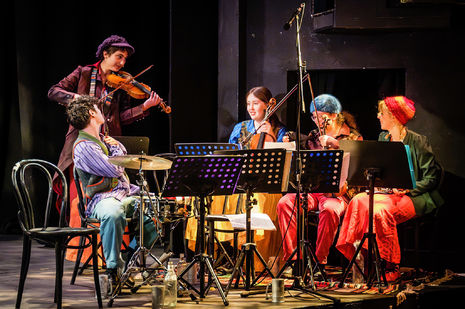Introducing the band: in defence of live music in theatre
Millie Wooler praises the efforts of the performances ditching the CD for the real thing

Truly, I can think of no greater torture than karaoke (except, perhaps, if the chosen song is by ABBA). I think hearing ‘Linger’ by The Cranberries butchered beyond recognition in a pub was the final nail in the coffin for me. Ever since, I have seen pre-recorded backing tracks as a cop-out. They communicate no more passion than can be conveyed by a drunk man slaughtering one of the most beautiful songs of all time. Whether at a gig or at the theatre, I need the music to be live, or else I fear I won’t be wholly convinced.
It is naturally difficult to find the talented musicians necessary to carry off a live performance, especially in amateur theatre. But I promise you that the difference is significant enough to warrant the extra effort.
“The temperamentality of the string family can leave you with goose-bumps”
Instruments are temperamental. I remember once during a final practice before a performance with my school orchestra, when the D-string suddenly snapped on my cello. It was less than an hour before showtime and the music teacher had to madly ring around everyone she knew until they found a replacement. It could very easily have happened during the performance itself, and all string instruments have a penchant for slipping out of tune at the most inconvenient moments. I think audiences find it quite amusing, but it frustrates the performers.
However, this unpredictability can be utilised to great effect. The live strings in the Corpus Playroom’s Intruder/Home, quite literally emanating from within the audience due to spatial constraints in the venue, were far eerier than anything that could be managed through even the most adept sound systems. Perhaps it’s clichéd to say that a violin has an unnerving quality to it, but simplistic measures such as this can really enhance the audience’s experience of the performance. Played well, the temperamentality of the string family can leave you with goose-bumps.
“Live music is far more adaptable to the mistakes of a live performance”
Of course playing into the temperamentality of live performance can fail miserably. I have seen several performances which have attempted to capitalise upon some more spontaneous genres. But folk music, for example, is hard. It is especially hard to carry off if it is not the natural habitat for the musicians in question. It requires confidence and an ability to let go of the classical constraints that we often perceive as the markers of a “good song”. When musicians have this confidence, the importation of elements of folk (or even a complete embracing of it) can enliven a performance. But, as I have seen on several occasions, it can also drain a performance of its finesse if the performers are not up to the task.
On a completely banal level, live music is far more adaptable to the mistakes of a live performance. Rather than playing the track start-to-finish over and over to disguise a somewhat elongated interruption between one scene and the next (or, worse, extending the length of time that the audience has to listen to the recording of cricket noises), a band can adapt the tune more smoothly, making the pause appear more natural. A good conductor should be able to follow the singer, meaning that a slight drop in the actor’s tempo from one night to the next should be covered by a similar adaptation by the other performers.
“Live music has a far more potent energy than a pre-recorded track”
Live music has a far more potent energy than a pre-recorded track – it’s why every music buff is so desperate to hear their favourite song performed live. Sly adaptations each time that it is played can give it new life, and the presence of the musicians within the space of performance allows the actors (and audience) to bounce off the spontaneity.
Something I noticed while reviewing Andrew Lloyd Webber’s Jesus Christ Superstar at the ADC earlier this term was how much the production (and the play) brings the musicians to the forefront. The audience are forced to appreciate quite how much effort goes into each song, each night. You could see throughout, not only how talented the band were, but also how much they enjoyed getting to showcase their skills. The live musicians should not be pushed to one side or dismissed as a “nice extra”: they are essential to the integrity of a performance. If they are not up to scratch, then the whole performance can fail to hit its mark.
It’s high time that more plays – like Jesus Christ Superstar – put the spotlight on this often under-appreciated but integral part of theatre.
 News / Judge Business School advisor resigns over Epstein and Andrew links18 February 2026
News / Judge Business School advisor resigns over Epstein and Andrew links18 February 2026 News / Gov grants £36m to Cambridge supercomputer17 February 2026
News / Gov grants £36m to Cambridge supercomputer17 February 2026 News / Union speakers condemn ‘hateful’ Katie Hopkins speech14 February 2026
News / Union speakers condemn ‘hateful’ Katie Hopkins speech14 February 2026 News / CUCA members attend Reform rally in London20 February 2026
News / CUCA members attend Reform rally in London20 February 2026 News / Right-wing billionaire Peter Thiel gives ‘antichrist’ lecture in Cambridge6 February 2026
News / Right-wing billionaire Peter Thiel gives ‘antichrist’ lecture in Cambridge6 February 2026










